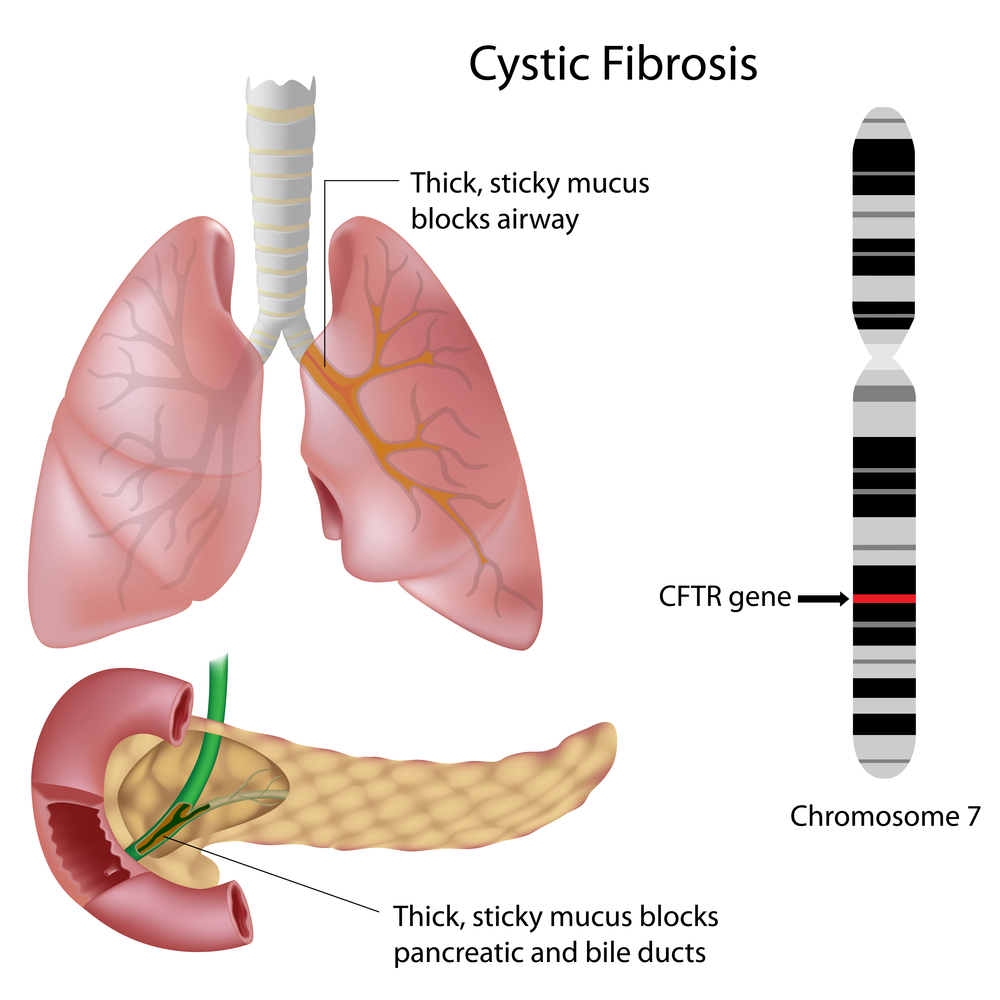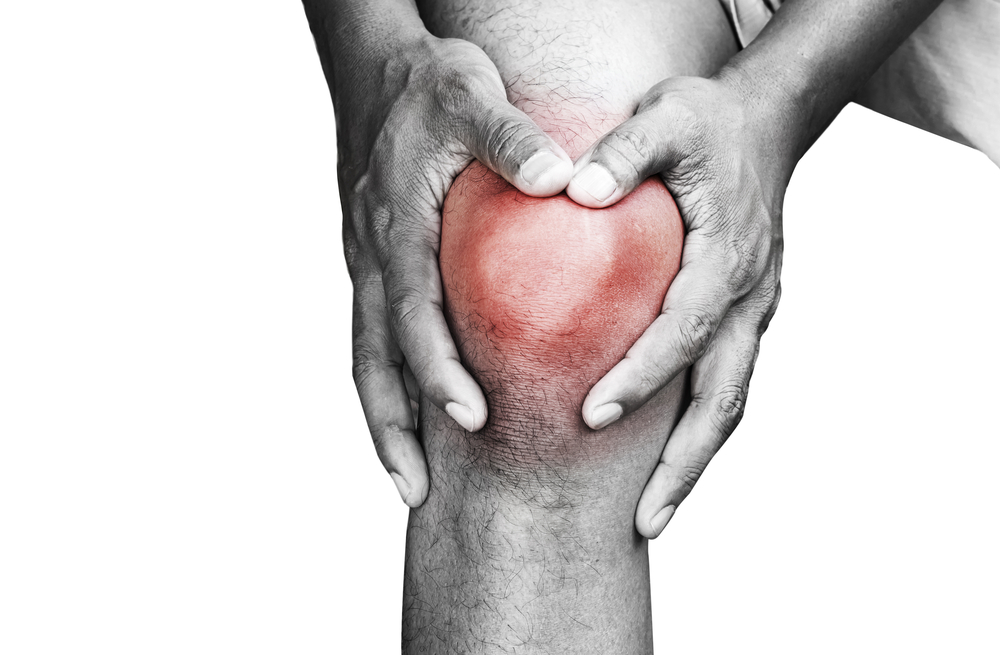Cystic fibrosis is an inherited disorder of the secretary gland that produces mucus, sweat and digestive juices. These juices are normally thin and slippery in nature but when cystic fibrosis occurs this secretion becomes thick and sticky and instead of acting as a lubricant, this secretion blocks passageways, especially in the lungs and pancreas. This disease causes severe damage to the lungs and digestive system.
 What happens here is a mutation or a defect in a gene later known as CFTR gene. The CFTR gene creates a protein responsible for transporting salt and water out of a cell. If this gene is defective, it will build thick and sticky mucus in the body’s passageways and block them. This gene is passed on to the infants in the womb by mother and infects them too. When this is carried to new borne babies, they should be treated immediately. All babies are born with a dark green substance known as meconium in their bowels. It forms the first faeces of a new borne infant and is passed out of the body a day or two after the birth. However, in some babies with cystic fibrosis, the meconium is too thick to be passed through the bowels and causes a blockage and an operation may be required to remove the blockage. Few babies may also develop symptoms of jaundice. This thick mucus developed due to genetic mutation not only affects babies but also the adults. The symptoms of cystic fibrosis vary in severity from person to person.
What happens here is a mutation or a defect in a gene later known as CFTR gene. The CFTR gene creates a protein responsible for transporting salt and water out of a cell. If this gene is defective, it will build thick and sticky mucus in the body’s passageways and block them. This gene is passed on to the infants in the womb by mother and infects them too. When this is carried to new borne babies, they should be treated immediately. All babies are born with a dark green substance known as meconium in their bowels. It forms the first faeces of a new borne infant and is passed out of the body a day or two after the birth. However, in some babies with cystic fibrosis, the meconium is too thick to be passed through the bowels and causes a blockage and an operation may be required to remove the blockage. Few babies may also develop symptoms of jaundice. This thick mucus developed due to genetic mutation not only affects babies but also the adults. The symptoms of cystic fibrosis vary in severity from person to person.
Complications of Cystic fibrosis
Cystic fibrosis that causes excessive accumulation of mucus influences various systems in our body, some of the systems getting affected by cystic fibrosis are explained here:
Respiratory System
In this case, mucus gets thick with the disease and plugs up the wind pipes that carries air in and out of the lungs. This causes respiratory problems like shortness of breath and difficulty in breathing, constant wheezing, inflammation of nasal passage and mucus containing cough and various others.
Problems caused due to cystic fibrosis in the respiratory system are:-
- Bronchiectasis: Bronchiectasis is a condition in which the lungs airways are abnormally enlarged due to mucus blockage, blocking the passage of air in and out of the lungs. Moreover, it promotes bacterial and fungal growth leading to infection. People with cystic fibrosis may have frequent bouts of sinusitis, bronchitis or pneumonia.
- Hemoptysis: People infected with this disease suffer from blood or blood-stained sputum.
- Pneumothorax: In this condition, air leaks into the space between the lungs and chest wall. The symptoms include chest pain and breathlessness.
- Respiratory failure: Cystic fibrosis can damage lung tissue so badly that it no longer works and becomes life-threatening.
- Sinus: People with cystic fibrosis can be prone to sinusitis which may need to be treated with nasal sprays or antibiotics.Also Read: How to Increase Your Metabolism?
Digestive System
Our digestive system contains mucus which prevents acidic reactions on the walls of alimentary canal and also facilitates a medium for enzymatic action. Mucus gets thick because the disease blocks tubes that carry digestive enzymes from pancreas to small intestine, and hence preventing the draining of enzyme. This further leads to incomplete or no breakdown of food. Also, the bile carrying tubes coming from liver and gallbladder to small intestine also gets blocked and inflamed, leading to liver problems. Often the consequences are poor weight gain and growth, Diabetes, Malnutrition, severe constipation, foul-smelling stools.
Below mentioned are the potential problems faced due to excess deposition of mucus:-
- Rectal prolapse: Frequent strain due to constipation cause prolapsing of rectal walls and protrude outside the anus, thus making it difficult to hold the stool or mucus. Females are more prone to develop this condition than males.
- Intussusception: A condition developed in children, causing the inversion of one portion of intestine of the intestine within other like an accordion. This results in bowel obstruction and should be treated immediately.
Worries with reproductive system
Both men and women with cystic fibrosis can have problems conceiving children. In case of men, their tubes connecting the testes and prostate glands are blocked and sperm passage is blocked, hence making them infertile. If they want to restore the fertility, certain fertility treatments and surgical procedures like IVF could be suggested. It is important to remember that condoms are still necessary to prevent STIs from spreading. For women, there is an increased thickness of cervical mucus, which can sometimes reduce fertility but they can conceive, with difficulties though.
Cystic fibrosis and osteoporosis
 Bone is strengthened by minerals like calcium and vitamin D, but in case of people infected with cystic fibrosis, they have trouble absorbing vitamin D abd are at risk of developing osteoporosis. Other risk factors influencing the onset of osteoporosis are delayed puberty, reduced exercise or weight-bearing activities, treatment with corticosteroids (which can lead to calcium loss).
Bone is strengthened by minerals like calcium and vitamin D, but in case of people infected with cystic fibrosis, they have trouble absorbing vitamin D abd are at risk of developing osteoporosis. Other risk factors influencing the onset of osteoporosis are delayed puberty, reduced exercise or weight-bearing activities, treatment with corticosteroids (which can lead to calcium loss).
Also Read: For a Healthy Heart, Keep Cholesterol at bay!
Treatments and drugs
The mucus secretion in our body is vital for carrying out physiological processes but when it is secreted in excess then it becomes life threatening and should be treated accordingly. Although managing cystic fibrosis is complex and could not be eradicated at one go or through one particular medicine, yet the efforts could be made in direction of reducing the inflammation. There are certain treatments aiming at curing cystic fibrosis by loosening and removing mucus from the ducts.
The options include:
- Antibiotics could be given to prevent the lung infections further. In case of lung infections, there are chances of cross infection. It is therefore recommended not to come in close contact with the people who have infection.
- Mucus-thinning drugs may be helpful as it loosens the mucus consistency.
- Bronchodilators dilate the widening of the bronchi for air passing.
- Natural Substances: There are certain diets to cure cystic fibrosis or at least prevent the infection from getting severe.
- Omega-3 : They improve pulmonary status by improving lung function, respiratory exacerbations and antibiotic consumption. They hinder over-production of mucus, caused by pulmonary bacterial infection in cystic fibrosis.
- Diet rich in vitamin A and E: A person infected with cystic fibrosis can increase the intake levels of vitamin A & E because the concentration of vitamins in the diet would provide more relief.
- Choline related supplements: Choline, belonging to the B-complex family of vitamins helps in transport of lipids and prevents the formation of mucus.
- Foods that contain antibacterial properties: Papaya, gooseberry, clove, cinnamon, lavender and peppermint oils contain antibacterial properties and prevent bacterial infection.
- Vitamin D: Diets possessing Vitamin D should be included in the diet of people infected with cystic fibrosis because their body stops resorption of Vitamin D, which leads to bone thinning and softening takes place. Also Vitamin D prevents the recurrence of pneumonia in children treated with antibiotics.
- Fish oil supplementation: Fish oil has therapeutic value and greatly helps in the treatment of cystic fibrosis.
- Oats: Oats are the sources of various digestive enzymes like lipase enzymes that break down fats into simpler substances so that they could be absorbed by the body.
If you found this article interesting and helpful, then please share it with your friends. Also, post comments in case you have any health queries.
Get such useful health tips and remedies regularly, on your Facebook feed.


